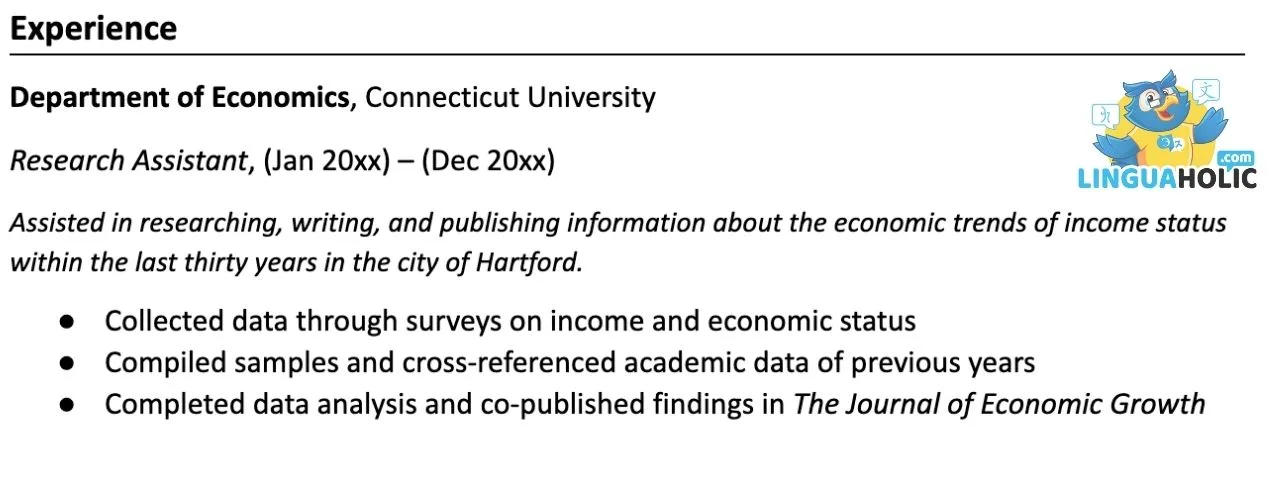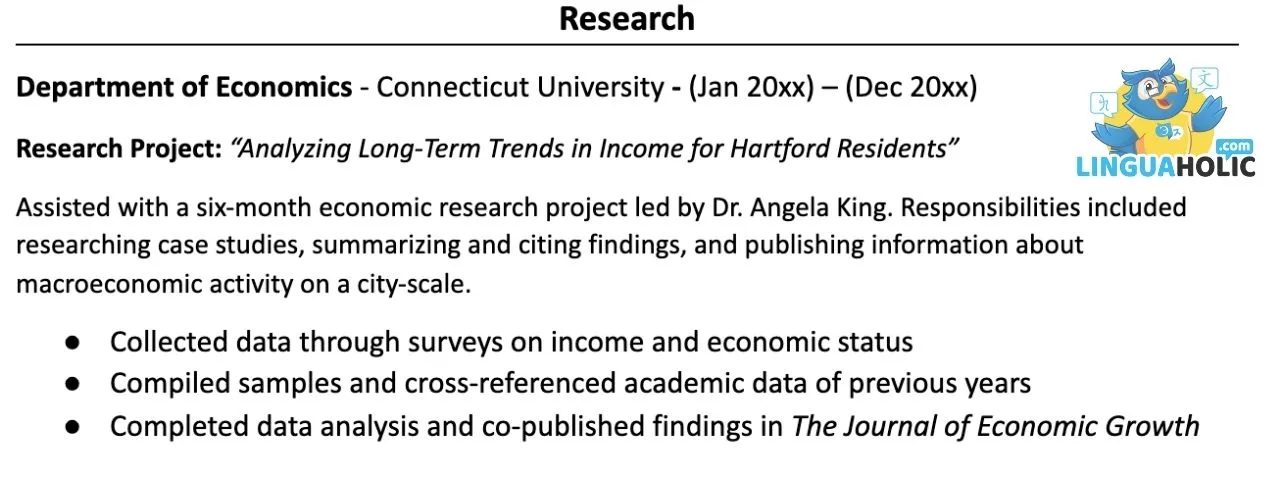Having experience with research is an asset which is valuable in any industry.
Research requires many different types of skill sets, most of which can be presented as relevant to a desired job.
There are many ways that you could frame research on a resume, so we will look at the most common and effective ones.
How to include research on a resume?
The best place to include research on a resume is in the experience section, or in its own research section. If the research was a paid job, it goes in the experience section just as a job would. Those with very little working experience may also choose to put it in the experience section to balance their resumes. Those with full, relevant job histories should put it in a new section to help it stand out.
When to include research in the experience section
The experience section on a resume is typically for professional job experience. For those who have done research as their professional job, it makes sense for this to be put in this section.
If you are looking to fill out the experience section due to a lack of professional work history, then it is also appropriate to include your research here.
Make sure that it is formatted properly and professionally in order to avoid it looking like “filler content”.
How to format research in the experience section
The formatting for a research project is important to make it look impressive. It is not often as straightforward as a job, which has a company name and company job title.
Let’s take a look at an example of a research project in a university economics department:
Experience
Department of Economics, Connecticut University
Research Assistant, (Jan 20xx) – (Dec 20xx)
Assisted in researching, writing, and publishing information about the economic trends of income status within the last thirty years in the city of Hartford.
- Collected data through surveys on income and economic status
- Compiled samples and cross-referenced academic data of previous years
- Completed data analysis and co-published findings in The Journal of Economic Growth
Here’s how it should look like on your resume:

As you can see, the formatting is largely the same as how one would list a different job. Because there are likely other jobs listed in this section, you need to be sure to format your research in a similar manner.
This keeps the resume looking neat and uniform.
It is not necessary to include the exact description of research beneath the research title unless it is relevant.
This is especially true if the resume already includes many types of experience.
Always keep in mind that things should only be expanded upon if they are both relevant and impressive.
How to format research in the research section
If your resume already has an impressive and relevant experience section, then it looks tidier to make a new section for your research.
This is especially true if you have a lot of different research projects to include!
This could be formatted in the same exact way as the example in the experience section.
If you are including a research section, however, it is more likely that your employer will want to know more about it.
Be sure to add relevant details, and perhaps divulge more here than you would in the experience section.
You could do this like the following example:
Research
Department of Economics – Connecticut University – (Jan 20xx) – (Dec 20xx)
Research Project: “Analyzing Long-Term Trends in Income for Hartford Residents”
Assisted with a six-month economic research project led by Dr. Angela King. Responsibilities included researching case studies, summarizing and citing findings, and publishing information about macroeconomic activity on a city-scale.
- Collected data through surveys on income and economic status
- Compiled samples and cross-referenced academic data of previous years
- Completed data analysis and co-published findings in The Journal of Economic Growth
Here’s how it should look like on your resume:

Depending on the number of projects you will list, you may shorten this by cutting out the research project name, or by including fewer bullet points.
Never go over two pages in a resume, because your employer is far less likely to approve a resume that takes over a minute to read.
Should you always include research on a resume?
This is a resounding no. Always keep relevance in mind when writing your resume. If you are applying for a job in the education industry, research is always relevant.
If you are applying for a job in economics, economics research is relevant.
Do not include unnecessary information, because it takes up valuable space on your resume and bores the one reading it.
The exception of course, is if you are a professional researcher and the work was paid.
Then it should always be listed as a job in the experience section.
Tips for making your research sound more impressive
Why should your employer care about your research experience? By keeping in mind the skills it has taught you, you can impress your employer by talking about them. These are skills such as
- Team building / Group work
- Leadership
- Independence
- Working on a deadline
- Initiative
- Etc.
By using confident language when writing your resume, you can make your reader subconsciously understand your skills. This can be done by writing lines such as
“Led a research group…”
“Created a department which…”
“Delegated tasks to others…”
“Trained and instructed new members…”
Already, this gives off the impression of someone who can take charge, properly delegate tasks, meet deadlines, and take initiative.
Make sure that your resume isn’t overwhelmed by jargon or difficult language but know that including a few key phrases can make you stand out.
Read some examples suggested by Indiana University SE and take your resume to the next level!
How to flow from resume to interview
While including research on your resume, you should always ask yourself the questions, “How did this research project help you grow as an employee” and “How can you use these skills to help you at X job?”.
Not only can these questions help you write a more thorough and impressive resume, but these are questions that are likely to come up in your interview.
Ensure that your employer gets the most out of your answer by including the skills listed above.
The employer cares less about the exact research that you did, and more about what skills and experience you got out of it.
Step one is writing the impressive resume, step two is knowing how to talk about it!

Hey fellow Linguaholics! It’s me, Marcel. I am the proud owner of linguaholic.com. Languages have always been my passion and I have studied Linguistics, Computational Linguistics and Sinology at the University of Zurich. It is my utmost pleasure to share with all of you guys what I know about languages and linguistics in general.

